Spend a few minutes talking to anyone involved in cannabis social equity programs and you’ll hear the same comment: we need more access to capital. Beyond that, calls for less red tape and more meaningful education are among the most common talking points. But we decided to dig a little deeper and talk to the people involved–across the US.
But first, an overview. Last month, The Minority Cannabis Business Association put out a National Cannabis Equity Report and Digital Research Map that dives into the current state of cannabis social equity in America. The group identified what advocates and lawmakers should consider for these programs, and concluded that:
- The efficacy of state social equity programs do not reflect expressed commitments to equity
- Criteria excluding race in definitions do not yield a diverse market
- State-level license caps are prohibitive to diversity
- Most programs do not provide timely access to funding
- The requirement to secure premises before receiving a license has proved disastrous
- Bans on people with former cannabis convictions are still an issue
- Medical market inequities tend to carry on into adult-use markets.
Did you catch all that? Point is, there’s a lot to address. Concerns about social equity programs are prevalent across the board and several overlapping issues are plaguing adult-use markets that claim to want to foster a more equitable industry.
To get a clear picture, we’ve spoken with social equity license holders, advocates, council members, commissioners, and others directly involved in the push toward social equity in the cannabis industry.
Access to capital is a must
“States that aren’t coming with capital are really missing the mark,” said Jeannette Ward Horton, CEO of NuProject, an Oregon social equity nonprofit supported by the city of Portland’s historic reinvestment of cannabis tax revenue. “What we hear from other entrepreneurs is ‘We aren’t getting funding.’ The little bit of tax money we get helps them float but it doesn’t help them compete.”
This was echoed by Rebecca Colett, who wears many hats in the Michigan cannabis industry. She is the CEO of cannabis brand Calyxeum; the executive director of its nonprofit arm, Calyxeum Catalyst, which works to improve Detroit neighborhoods; as well as the founder of the Detroit Cannabis Project, a program supporting social equity applicants.
“If a social equity program is going to succeed in creating a more equitable, diverse industry, it’s going to need to start by helping entrepreneurs access capital,” she told me. “Applicants are often discouraged because the program and the list of things they have to do simply don’t add up. They’re like, ‘I’ve got this long list of things to do to accomplish the goal and the social equity program will only get me 10% there,’” she said, adding that no government program gets you all the way, but most take people further than 10%.
It’s why New York’s upcoming social equity program has lately received so much praise. “New York has set up arguably the most progressive social equity framework ahead of the launch of legal sales, including the creation of a $200 million public-private fund to promote social equity,” Bridget Hennessey, Vice President and Director of Government Relations at Weedmaps told me.
While many point to education as an important aspect of social equity, most insiders say that’s not enough.
“I struggle when the first solution and the only solution is training programs that don’t come along with capital because I think we are smart enough to know that capital is what makes a business go,” Jeannette Ward Horton told me.
“I can train you until I’m blue in the face but if you don’t have the money to execute on this stuff – and it all takes money – then you’re not going to move the needle. We are beyond just talking about training programs and if people are not talking about capital, then they’re not serious about this work.”
Tucky Blunt, a social equity license applicant from Oakland, California who runs Blunts + Moore, told me his experience with training programs in Oakland. “Yes, they have a technical assistance program, I’m not gonna discredit that,” he said. “But the people running these programs aren’t in cannabis and they’re learning from us. How are you learning from us but you’re the ones supposed to teach us? It’s weird,” he said.
To zoom in even closer, we’ve compiled a list of each state with adult-use cannabis to compare their social equity provisions and get feedback from relevant industry players. Here’s what we gathered:
- Alaska
- Arizona
- California
- Colorado
- Connecticut
- Illinois
- Maine
- Massachusetts
- Michigan
- Montana
- Nevada
- New Jersey
- New Mexico
- New York
- Oregon
- Vermont
- Virginia
- Washington
Alaska
Alaska is a beautiful place with a lot to admire. When it comes to social equity in cannabis, though? We have nothing to report.
Arizona
Under Arizona’s program, 26 licenses are set aside for social equity applicants, including people with previous cannabis convictions, those who fit income requirements, and those from qualifying municipalities. Standard application and licensing fees amount to $25,000 in Arizona, but social equity applicants have a reduced, non-refundable fee of $4,000. No specific training or education programs for social equity program applicants were identified from the Arizona Department of Health Services website.
The program has drawn a lot of criticism from advocates, who find the lack of transferability constraints are opening the program to corrupt practices. Those who qualify for the program can be awarded a license and immediately sell it to a non-social equity entrepreneur, rendering the program useless.
“When you create a program like this, where licenses are freely transferable on Day 1 and are transferable to other people other than social equity applicants and doesn’t have any strings attached…you’ve created a system that’s just right for exploitation,” said Julie Gunnigle, a board member for the Arizona chapter of NORML in an interview.
Other advocates have pointed to corrupt practices carried out by aspiring license holders preying on potential social equity applicants. This includes some companies allegedly sending out flyers or visiting door-to-door in areas of disproportionate impact trying to get applicants to sign predatory agreements that will allow the company to get a license under the guise of social equity.
Activists filed a lawsuit against the state in response to its licensing practices, but it was tossed in February. We’ll be keeping a close eye on the next steps for the state, as the social equity license lottery is set to happen sometime this spring.
California
California’s social equity programs exist only at the local level and vary across different municipalities. There is no statewide definition of “social equity” and most benefits are provided at the local level. The state does have one overall program for fee waivers, though, that applies to application, licensing, and renewal fees. Additionally, at least 60% of the dollar amount for waivers must be allocated back into equity applicants and licensees.
Though Oakland’s program allowed Tucky Blunt to open his dispensary, he says it still needs to be tightened up with more oversight, more cohesiveness across programs (not just Oakland), and more access to capital for its members across the state.

Additionally, LA’s program appears to be fraught with problems. Lack of startup capital is a huge issue for LA social equity businesses, especially when they are required to secure premises before applying for a license. Success stories exist, like Kika Keith, the first Black woman dispensary owner in LA. But to get where she is today, she had to fight hard, sue the city, and do lots of community organizing.
Despite its issues, by January of this year, LA had distributed 358 temporary temporary equity licenses to retailers, cultivators, manufacturers and distributors. The city is now transitioning temporary licenses into annual ones–a process the Los Angeles Times described as costly and complex.
In Sacramento, similar concerns exist. In an interview with Cannabis Business Times, Davina Smith, manager of the city’s Office of Cannabis Management, outlines problems such as lack of capital, a complicated regulatory system, limited access to business education, and trouble identifying viable business premises.
Though California’s programs vary across the board and have produced plenty of success stories, one thing seems clear: there’s more to be done.
Colorado
Washington and Colorado were the first to legalize cannabis back in 2012, and both failed to consider how to create an equitable industry from the start. Both states are playing a long game of catch-up, with Colorado in the lead.
The state currently offers access to the marijuana entrepreneur fund for loans and grants, as well as access to technical assistance. All microbusiness licenses are reserved for social equity applicants. State-level fee waivers or reductions are not available, though some municipalities offer them.
In Denver, delivery licenses are set aside for social equity applicants until 2027. But only 19 of the 206 dispensaries in the city have partnered with said applicants to bring delivery to fruition. Companies have pointed to logistical and financial barriers preventing them from implementing delivery.
“We’re requiring stores to work with social equity transporters, delivery companies and unfortunately, so far, not many stores have stepped up to the plate to show their support for social equity by getting a delivery permit and working with these companies,” Eric Escudero, Denver Department of Excise and Licenses spokesperson said in a comment to Denver 7.
That said, Colorado set diversity goals and has already surpassed them since beginning social equity efforts at the beginning of 2021. As of February 1, 2022, over 17% of the cannabis businesses in the state were minority-owned. Their original goal was to increase the number from 15.2% to 16.8% by June 2022, so they surpassed it several months earlier.
But if we break it down, the numbers aren’t as optimistic. October of 2021, Westword reported that only about 2.9% of businesses are Black-owned, 7.7% are Latino-owned, 3.9% are Asian-owned, and 83.7% are white-owned.
Connecticut
Connecticut’s social equity program was created in 2021 following adult-use legalization. Sales have not yet started in the Constitution State, but are expected to begin by the end of 2022. The social equity program comes with income or residency requirements in disproportionately impacted areas, but no provisions exist for people with previous cannabis convictions. Up to $50 million has been designated by Connecticut law for initial funding for start-up capital, business accelerator programs, and workforce training. Social equity applicants are given a 50% discount on application and licensing fees for the first three renewal cycles.
The state opened its first applications period in February, with six licenses going to general retailers and six to social equity applicants, defined by people living in areas of disproportionate impact who meet income requirements.
I spoke to Andrea Comer, the deputy commissioner of Connecticut’s Department of Consumer Protection, and the Chair of the state’s social equity council.
“The things that keep me up at night are access to capital and applicants, particularly social equity applicants, having high hopes and not succeeding,” she told me.
Social equity applicants are subject to a financial cap. “Those seeking to apply as a social equity applicant cannot exceed 300% of the state’s median household income,” Comer explained. “That is currently around $75K, so social equity applicants cannot have earned more than approximately $225K annually over the last three years.”
Cultivator license applications also opened for those in disproportionately impacted areas. While these are not subject to the lottery system, they come with a hefty prohibitive fee to enter: $3 million. The fee is written into the law, so it cannot be waived or even reduced unless the law is changed. So to qualify as a social equity applicant, you must make under 300% of the state’s median household income, roughly $225,000 per year. But if you want to use your social equity status to obtain a cultivation license, you need to come up with $3 million.
In an interview with Filter Magazine, Students for Sensible Drug Policy president Jason Ortiz said, “So the government is going to charge someone who is certified as low-income multiple millions of dollars in order to skip the line. That is in no way, shape or form equitable.”
We will be keeping an eye on Connecticut as more moves are made toward recreational sales and social equity. For now, we see lots of room for concern as the state has a broad definition of who qualifies for social equity and hefty fees written into law that are likely to prove prohibitive.
Illinois
While it was the first state to legalize adult-use cannabis with a social equity program included, eager business owners in Illinois remain held up because of lawsuits relating to the licensing process. Application scoring was meant to be weighed in favor of social equity applicants, but it may have actually favored military veterans instead, which would be a violation of both state and US constitutions. For now, we’re waiting to see how the social equity program holds up against the lawsuits.
On paper, the state’s social equity provisions sound good: 43% of licensees are Black, 10% Latino, 9% are coalitions of people of color, and 4% are Asian. Licensing fees for social equity applicants are cut in half, technical support is available, and the state also offers R3 (Restore, Reinvest, Renew) loans and grants in civil legal aid, economic development, reentry, violence prevention, and youth development. But 185 licenses have been held up for over a year now, and license holders are at risk of running out of money and resorting to selling their licenses.
Douglas Kelly, the executive director of the Cannabis Equity Coalition Illinois, told the Chicago Tribune “If it takes another six months to a year, you might as well tear up those (diversity) numbers.” Kelly was an applicant for the program but was disqualified in the scoring process without being given a reason.
I spoke with Chima Enyia, the Executive Vice President at Cresco Labs, which operates SEED, or the Social Equity & Education Development™ program. He believes the courts will eventually work themselves out, and says it’s Cresco’s job as an MSO to help prepare others for when they finally get the green light.
“The fact that social equity is central to the conversation in all of these states is a positive,” he told me. “I think it is incumbent upon all of us to double down and ensure it is centered in state-by-state conversations as well as federal.”
“I think there are some really positive things that came out of Illinois’ bill. For example, the loans and the capital program. I think the R3 grants are very positive, now it’s just about the implementation,” he added.
Maine
We’ve previously noted that the Maine cannabis industry is lagging in social equity provisions. Proposed provisions have been shot down in lawsuits with opponents worried about constitutional rights and discrimination against interstate commerce. A bill to expunge and seal cannabis-related records in Maine was also shut down by the legislature in 2019, preventing people with previous cannabis convictions from entering the legal industry.
I talked with Matt Warner, a partner at Preti Flaherty, a law firm with a Cannabis Business Group serving New England’s cannabis businesses. In addition to his work in Maine, he has worked with groups in Washington, Oklahoma, Illinois, and several other states.
“Before Maine can institute a meaningful social equity program, it needs to do its homework. This means collecting the necessary data to understand which populations have been disproportionately impacted by the War on Drugs,” he told me. “I’m sure racial and ethnic minorities and lower-income households bore the brunt here, same as everywhere else, but Maine is one of the least diverse states in the country and so without good data here, I don’t think we can model our efforts after those in places like California or New Jersey.”
We’ll be keeping an eye on Maine’s budding industry, but we aren’t feeling optimistic about its attempts (or lack thereof) to repair damage from the War on Drugs.
Massachusetts
Both Colett and Goins pointed to Massachusetts as a model state for social equity. “Their program isn’t just fulfilling the policy. Their program offers an infrastructure that ensures success for their social equity applicants. The infrastructure includes education, financing, and mentorship,” said Goins.
Massachusetts was the first industry to offer a statewide social equity program. But those directly involved don’t always see it as a model for others, especially when, as of 2021, the industry was about 73% white-owned. Social equity program participants get priority review and exclusive access to social consumption establishment licenses, marijuana delivery operator licenses, and marijuana courier licenses for at least two years.
“None of them are working,” said Ulysses Youngblood, who opened Major Bloom, a dispensary in Worcester through the state’s economic empowerment program. The economic empowerment program is a branch of the overall social equity program but is smaller and does not offer the same technical resources. Instead, it gives priority application review, and the same fee reductions for license applications.
While the fee reductions may help, Youngblood doesn’t think they are enough when there aren’t other means of accessing capital through the programs.
“To be real with you, the difference between ten and five grand is nothing when it’s millions of dollars to get in this shit.”
His company got its designation in 2018, hosted its required community host agreement in 2019, and was finally able to open shop in August of 2021. Youngblood considers Major Bloom to be one the lucky ones, as his company was selected for a license out of over 60 other applications and now represents the first Black-owned dispensary to open in Worcester.
Major Bloom sits in a highly-saturated area for dispensaries. They were the 12th and final dispensary to open in the municipality, while billion-dollar corporations had the ability to open on day one, Youngblood emphasized.
Michigan
Michigan legalized recreational cannabis in 2018 and developed a social equity program three years later. This came after a 2020 report found that 79% of Michigan cannabis owner were white, only 3.8% of owners were Black, and only 1.5% Hispanic or Latino. The program allows applicants with businesses in disproportionately impacted communities to receive up to 75% off of application, license, and renewal fees. They also offer educational sessions for various aspects of running a business. While Michigan has a large cannabis market, Detroit is still waiting on recreational sales to begin as the city’s program is held up by lawsuits.
“I kind of equate social equity programs nowadays to coupons,” said Rebecca Colett of Calyxeum. “You get a certain percentage off if you meet certain criteria for applications and license fees, but then that’s really it. After an applicant gets certified as a social equity applicant, then what?”
Rebecca and her team have a good rapport with the Marijuana Regulatory Agency. She says that they ask for, review, and often implement feedback. She has seen the agency add more items and benefits to the program but still finds it falls short of truly supporting new cannabis entrepreneurs.
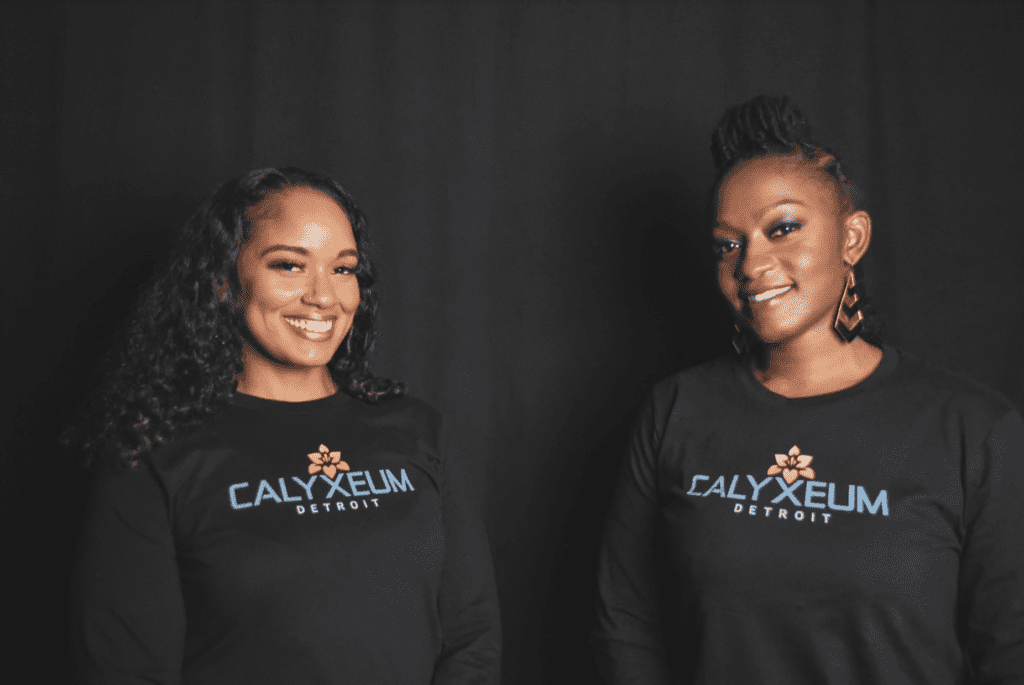
Sure, there are some resources available from the program she says, but she emphasizes that hosting a webinar or two a month is not enough to build a diverse industry.
Colett’s envisions a social equity fund that would come both from tax revenue and from contributions by MSOs who have entered the Michigan industry.
Her overall opinion on the state of social equity in Michigan?
“They’re like, ‘Hey we want this industry to be more inclusive,’ but really it seems like they’re making it more convenient for MSOs to enter vs Michiganders of color and social equity status. The actions don’t line up with the words.”
Montana
The Montana report is short and not so sweet. Czelsi Gómez, Public Information Officer at the Montana Department of Revenue, confirmed with me via email that “The only social equity program that exists within the Montana cannabis framework would be the Combined Use Licenses. Those licenses have been carved out specifically for the federally recognized tribes in Montana to utilize within 150 air miles outside of the reservation’s boundary.” Each of Montana’s eight tribes can receive a combined-use license, though only some have decided to go through with it.
Nevada
Nevada does not currently have a social equity program, but the landscape is set to change. Consumption lounges are gearing to open as early as June of 2022, with 10 out of the 20 available set aside for social equity applicants. But as of right now, there is no definition of what that means.
“My largest concern is the lack of infrastructure for these candidates. It would appear there is no investment in their success,” said A’Esha Goins, owner of Black Joy Consulting and someone who has spent a lot of time working with Nevada policymakers on the topic.
“There is a huge difference between social equity programming and social equity policy. Nevada has passed social equity policy. Nevada has not invested in social equity programming.”
Goins mentioned that there is no history of success for social consumption lounges, as they are a relatively new category. He says that it’s unfortunate that social equity has been tied solely to this license.
Tick Segerblom, a member of the Clark County Commission from District E, has long been an advocate for legal cannabis and has worked closely with A’Esha and others tackling the Nevada cannabis industry. He told me that at a state and local level, a social equity program is close to coming together.
“Although, you could argue the horse is already out of the barn given the fact that the licenses for dispensaries have already been given out,” he said.
He mentioned that the law was written so that all existing dispensaries can get a lounge too. “That’s just going to reinforce the current situation.” Eventually, he hopes social equity-owned lounges can begin to sell products as well, diverting from dispensaries serving as the only point of sale.
The only way Goins sees a more inclusive market becoming reality is the introduction of affordable licensing, noting that this will require lobbyists and legislatures to help make it happen.
“Anytime lobbyists are involved, I am concerned about the other interested parties. How do we have an inclusive marketplace if the community that needs to be included isn’t sitting at the table?”
New Jersey
New Jersey’s adult-use sales will begin soon, though we don’t have a set date yet. There aren’t many social equity provisions set either, though we know applicants will get priority review and microbusinesses can expect a 50% discount on licensing and application fees.
“We don’t have a baseline or a track record,” said Edmund DeVeaux, the president of the New Jersey CannaBusiness Association (NJCBA), which he equates to being the state’s cannabis chamber of commerce. He told me that before the state had established a definition of social equity, people were calling themselves “consultants” and falsely promising to help others get a social equity license, before even knowing what that would entail. “In any industry, you get your fair share of that, but it was definitely concerning in the new cannabis industry because their target audience were people of color, the majority of them with limited means.”
New Jersey’s social equity program includes people with prior cannabis convictions, those who meet low-income requirements, and those living in qualifying municipalities. Social equity, diversely-owned, and impact-zone businesses are said to have priority over other licenses, and microbusiness licenses applicants have priority over standard ones.
“What keeps me up at night is, how do we make sure we strengthen the social equity program now that we know what it means? How do we strengthen future applicants’ ability to go after licenses?” DeVeaux told me. “We’ve got to deal with the potential lack of business acumen. We want business people that are going into cannabis. Not cannabis people that are going into business.”
DeVeaux expressed gratitude to the legislatures that allowed the NJCBA to weigh in and contribute to discussions. He told me that the Cannabis Regulatory Commission had previously said they had awarded licenses to diverse companies, but the NJCBA wanted to see it go a little deeper than that. “The intent of the legislation was to make sure you actually had people of color, not just diverse companies, but Black-owned, Latino-owned companies.”
We’ll be keeping a close eye on New Jersey to see how its social equity provisions hold up in the new market.
New Mexico
In November of 2021, The New Mexico Regulation and Licensing Department’s Cannabis Control Division (CCD) announced it was ready to start work on social equity policies. The department offered a survey for the public that asked opinions on barriers to entry into the adult-use industry.
Since requesting public opinion and developing a program, the CCD’s social equity plans take a different route than others we’ve seen. The CCD is working to bolster microbusinesses, defined in the state as ones that produce or sell up to 200 plants, as a way to promote social equity in the industry.
Microbusinesses will not require location approval and will be able to apply for loans of up to $250,000. Given the barriers that licensing and approvals can cause, as well as lack of access to capital for new businesses, it sounds like New Mexico is on the path to ensuring social equity. The limit of 200 plants or less, though, may make it difficult for successful social equity-owned businesses to eventually scale up.
“The Cannabis Control Division, throughout our ongoing open and transparent rulemaking process, has listened to and really heard concerns that it’s hard for microbusinesses to access the capital needed to start a successful business,” said Regulation and Licensing Department (RLD) Superintendent Linda Trujillo in an interview with The Paper.
The state has also made a goal to distribute at least 50% of cannabis licenses and jobs to social equity applicants, much like New York. As of now, we don’t know if this is going to happen.
While there will inevitably be issues to work out and changes to come, it sounds like New Mexico is making good strides to repairing damage from the War on Drugs. We’ll keep a close eye on the state to see if this remains true.
New York
Many people I spoke with pointed to New York as an example of how cannabis social equity programs should operate. There’s no doubt that the state is setting a good precedent for what a program can look like, but we can’t say how successful this will be just yet.
Good news keeps coming, though. In January of this year, Governor Hochul pledged $200 million to boost social equity efforts, saying the action will put their commitment to equity into practice. “New York will lead where many other states have fallen short,” she said in her address.
The fund is meant to provide capital and financing to social equity applicants to reach the state’s goal of awarding 50% of all cannabis licenses to equity applicants. This includes people from impacted communities, minority and women-owned businesses, distressed farmers, justice-involved people, and service-disabled veterans.
The state has also announced that the first couple hundred retail licenses will go solely to people with prior cannabis convictions, another step toward repairing harm from the War on Drugs.
All eyes seem to be on New York as it pushes closer to legal adult-use sales. We’ll keep you updated on the progress.
Oregon
Oregon’s law was implemented without social equity provisions. I spoke with Jeannette Ward Horton of NuProject, who detailed the difficulties of trying to build social equity in an established market. “We are trying to go back after the fact and it’s hard,” Ward Horton told me.
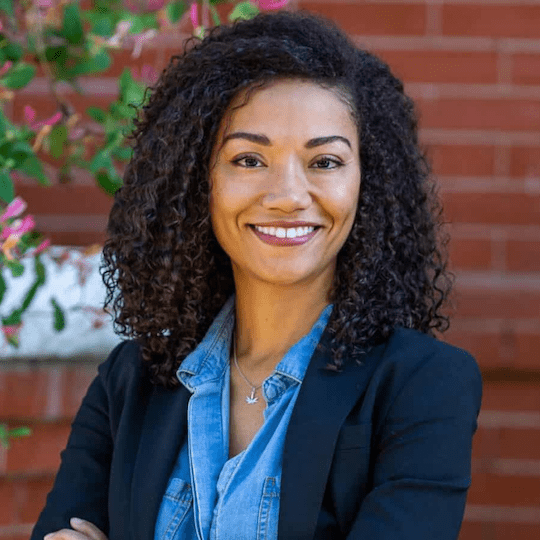
Ward Horton and other advocates have been fighting hard to change this and recently celebrated the passage of ant Equity Investment Act that secured a $15 million fund from Business Oregon for culturally-responsive, community-based organizations that serve people with two or more economic equity risk factors. Advocates were originally pushing for a $50 million fund, though. Furthermore, the Equity Investment Act is not designed to help cannabis businesses, but rather to reinvest in communities hurt by the War on Drugs.
Advocates tried to push for more ambitious social equity legislation last year, but state lawmakers killed it without explanation.
Some areas of Oregon are pushing equity forward in different ways. Ward Horton told me that Portland voters established a 3% retail tax on cannabis products to reinvest into social equity, some of which makes it back to her Portland-based non-profit, NuProject. Qualified applicants in Portland’s program can also receive fee reductions and receive reimbursements for incurred costs.
But Ward Horton emphasizes that’s not enough. “We can only impact a small number of businesses operating in Portland with that City of Portland funding. If we got state money, we could really do something about all of Oregon,” she told me, noting that many entrepreneurs of color operate outside of the city because it is cheaper to open a cannabis business in the suburbs.
Another problem for Oregon social equity? License moratoriums have returned. I spoke with Ward Horton before the moratorium bill passed, and she expressed concern about what they will do to Oregon’s landscape. “We will be worse in terms of equity and need even more capital for our founders of color to compete because getting a license is going to cost $60,000 instead of $5,000.”
Vermont
Recreational sales in Vermont are expected to start as early as the Fall of 2022. We can expect to see social equity provisions included in the Vermont cannabis industry, though their effectiveness will not be clear until later.
Cannabis Control Board chair James Pepper told Vermont Public Radio, “We have sufficient data and reports to show that there were—and there continue to be— disparate arrest rates and disparate incarceration rates of people of color, as it relates to drug crimes. A major motivating factor for a lot of legislators—who agreed to this bill, when they otherwise wouldn’t—was that they felt the need to end prohibition, and the War on Drugs, and start to mitigate some of the harms that have been perpetuated over the last 80 years.”
Pepper wants to see financial incentives to create a diverse Vermont cannabis industry, including eliminated fees and special loans and grants. “And because this deals with the allocation of state tax dollars, the social equity provision will require legislative approval,” he said.
We’ll be keeping an eye on Vermont’s progress toward social equity.
Virginia
Recreational sales in Virginia are not expected to kick off until 2024. The original law proposed social equity provisions to scratch the surface of repairing the harm caused by the War on Drugs, but some lawmakers weren’t having it.
Glenn Davis, who represents the Virginia House of Delegates 84th district, was one of those people. “Do I have a problem with them saying ‘Because you broke the law, I’m going to give you a special license’? Heck yeah,” he told Wavy.com. “What you’re saying is if something is illegal, and you don’t agree with it, break the law because if it became legal you go to the front of the line to benefit from it. How asinine is that?”
Davis promised to fix what he sees as a mess and prevent taxpayer-funded money from going to his definition of “criminals” should Republicans take back the House of Delegates. While Republicans did take back the house in November, we remain hopeful that advocates will continue to push social equity in Virginia forward.
“The final decisions about social equity lie with legislators. While we expect the definitions to change from what they were last year, we stand ready to support a cannabis market that includes businesses of all sizes owned by all types of Virginians,” said Ngiste Abebe, VP, Public Policy for Columbia Care, an MSO that operates dispensaries in Virginia.
Washington
Despite legalizing recreational cannabis a decade ago, Washington is behind on social equity provisions. A social equity plan was created in 2020 and the state is playing a long game of catch-up.
“I’m optimistic because it can’t get any worse,” said Raft Hollingsworth, co-owner of Washington’s only Black-owned cannabis farm, The Hollingsworth Cannabis Company.
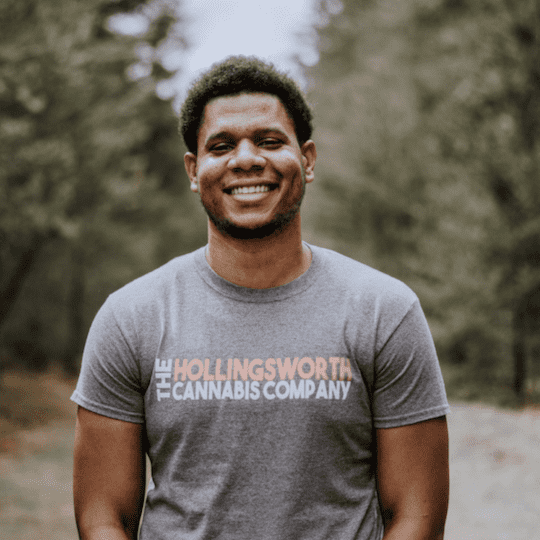
Raft is on the state’s social equity task force, a group of industry professionals, state agencies, and communities affected by the War on Drugs working to give recommendations to the state’s Liquor and Cannabis Board (LCB).
He told me he gives “total props to the executive branch” for taking action on a big recommendation from the task force: a community reinvestment fund. In December of 2021, Governor Inslee announced a plan to distribute $125 million annually to communities facing social and economic disparities from the War on Drugs.
While Raft is excited about the fund, his remarks on the Liquor and Cannabis Board weren’t as positive. His team gave the LCB scoring rubric recommendations to help decide how new licenses would be divvied up in the future. “A big point of contention was having race be a factor in the scoring,” he said. The LCB ended up removing the task force’s references to race from the scoring rubric, much to Hollingsworth’s frustration.
The task force is currently pushing to add delivery licenses and consumption lounges for social equity applicants to Washington’s industry, Raft told me before expressing doubt about it actually happening.
“But I didn’t think this huge community reinvestment pool would happen either, so I think everyone is just inspired and ready to work on it.”
Final thoughts
Jeannette Ward Horton of NuProject raised a great point in our discussion. The more we highlight negative stories about social equity not working, the more ammunition we give opponents who do not want these programs to exist at all. As we have tried to get closer to the truth behind these programs and gather opinions from those directly involved, we’ve started to gain a clearer picture. These programs are far from perfect, in most places, they’re barely scratching the surface of what needs to be done. But they have to keep going.
As Tucky Blunt told me, these programs need to be tightened up. Oakland’s social equity program is the reason Blunt was able to launch a dispensary in the first place, and while it needs work, we can’t discredit the successes it has created, like the opening of Blunts + Moore, alongside 186 other equity businesses in the city.
And then there’s Kika Keith, who saw numerous problems with LA’s equity program and decided to push forward anyway, suing the city of Los Angeles, equipping other applicants with industry knowledge, and developing a place of resistance. Her efforts paid off, as she became the first Black woman to own a dispensary in LA.
Legalization continues to roll out across the country and each state can learn from one another’s failures and successes. Social equity should be at the front of everyone’s mind as the industry continues to advance.
“The system is like turning the Titanic,” said Ward Horton. “It’s already worn its grooves in inequities. The ship is so big–big governments, big systems. It’s hard to get it to move in a new direction. It’s really about resistance to change, and change is scary. We’re not going to turn the whole ship, so how do you chip away at it?”


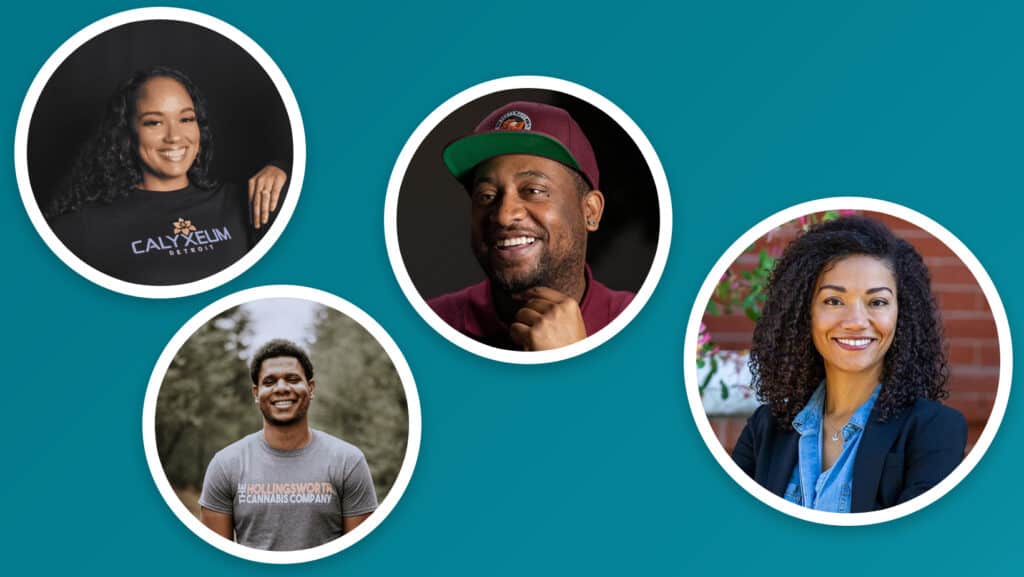

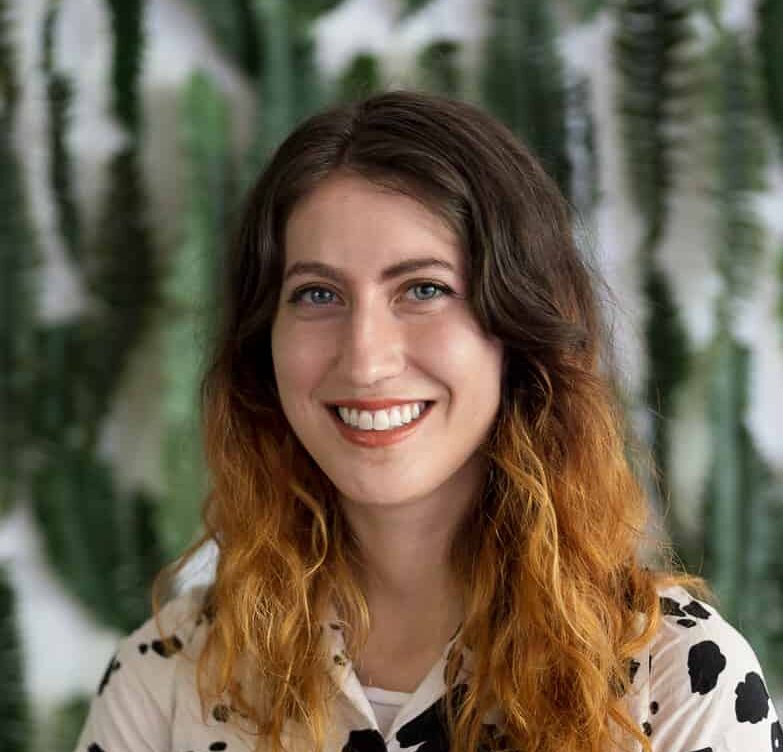

3 thoughts on “Is anybody getting it right? An inside look at each state’s efforts toward equity”
Pingback: Truth or dab, big blunts, and stoned squirrels: Our favorite memories of getting lit - MJ Brand Insights
Pingback: A Potential Flaw In New York’s Cannabis Regulations Could Hurt Social Equity Operators -
Pingback: Council Post: A Potential Flaw In New York’s Cannabis Regulations Could Hurt Social Equity Operators - dailystarx